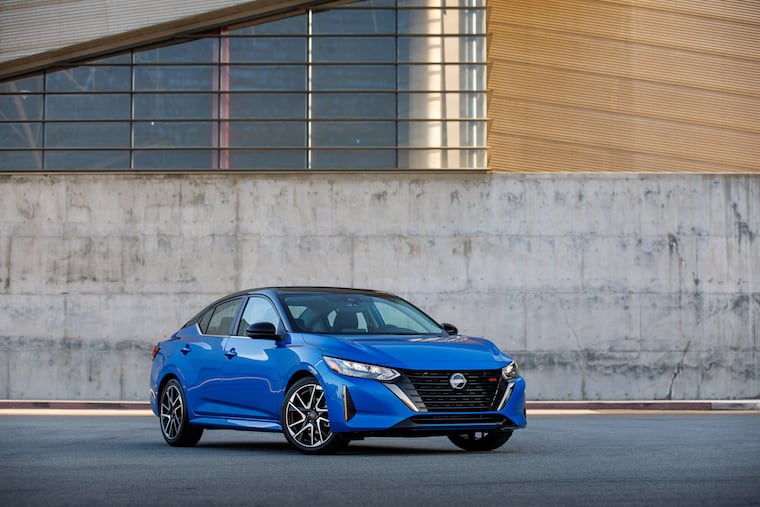2024 Nissan Sentra: Here’s how it compared to the Volkswagen Jetta
The redesigned small sedan seemed peppy and comfortable, but it fell short in several areas.

2024 Volkswagen Jetta 1.5 T SEL vs. 2024 Nissan Sentra SR: Small sedan scrum.
This week: 2024 Nissan Sentra SR.
Price: $27,835 as tested. The Premium Package added a sunroof, power driver’s seat, Around-View monitor, 8-speaker Bose premium audio, and more for $2,490.
Conventional wisdom: Car and Driver cheers that it “doesn’t skimp on standard safety features, comfy front seats, affordable optional equipment,” and pans “almost no go behind its show, noisy powertrain, its rivals are far more fun to drive.”
Catching up: Last week we tooled around in the Volkswagen Jetta, which moved nicely and was reasonably fun to drive, with nice fuel economy. How does the Sentra compare?
Marketer’s pitch: “More action.”
Reality: Honest, I didn’t set this comparison up to be a smackdown. I picked them on price and size, having forgotten the specifics of the reviews.
Competition: In addition to the Jetta, there’s the Toyota Prius, Honda Civic, Kia Forte, Hyundai Elantra, Subaru Impreza, and Toyota Corolla.
What’s new: The Sentra gets a new front fascia and restyled headlights, and a redone continuously variable transmission (CVT) intended to improve shifting and fuel economy.
Up to speed: The 2-liter, four-cylinder engine creates 149 horsepower, but the little sedan feels peppy zipping around town.
In fact, it’s a little too peppy moving around the driveway. See if you’re comfortable with the setting of the idle, or whatever the kids are calling it nowadays, because it seemed awfully jerky at first. (The Jetta offered its own jerkiness, but this seemed next level.) We did adjust to each other, though, like the Jetta and me.
In any case, “peppy” in small cars can be an illusion; you’re riding low to the ground and a lot of bad things can happen between 30 and 50 mph.
It takes the Sentra an interminable 8.8 seconds to get to 60 mph, according to Edmunds. The Jetta shaves almost 2 seconds off that 0-60 time with just 10 more horses.
The Sentra also did not come with any Sport mode, just Normal or Eco.
Shifty: A lot of the power gets swallowed up by the CVT with no real shifting options. I could feel the engine starting to get a move on under hard acceleration, but then, nope, gotta avoid the redline.
On the road: The Sentra handles about as indifferently as it accelerates. There’s nothing fun on the curves, and highway seams can hit a little hard.
Driver’s Seat: Nissan makes a comfortable seat, and the Sentra is no exception. The driver’s compartment does feel exceptionally small though. Tall people will be unhappy with the headroom, I’m sure.
The gauges are small and the speedometer doesn’t really make itself known. If not for the digital speed setting in the central display choices, I’d really not know how fast I was going.
Friends and stuff: I feared the tight feeling in the front seat meant the back row would be far too snug, but that was not the case. The seat was not roomy, but no worse than most vehicles in this class, not even the Jetta.
The console intrusion is minimal and the hump not too high, so middle passengers will be spared the piling on of indignities they are often forced to suffer through.
Cargo space is 14.3 cubic feet.
Play some tunes: The 8-speaker Bose stereo warrants about a B grade for sound, maybe even a little lower. Playback is acceptable, but there’s not a lot of adjustment to be made. Advantage Jetta.
Operation is simple enough, with knobs and a touchscreen, and a few buttons as well, but getting to the sound adjustment is a several-step process once you’re in CarPlay.
Keeping warm and cool: The HVAC and seat heaters do a nice job of warming occupants, as we had the vehicle during one of the coldest days in 2023.
Operation is simple as well, with dials for temperature and buttons for the rest of it. A small display panel lets you know what’s going on separately from the main infotainment screen.
And round vents mean easy adjustments and easy closing as well.
Fuel economy: I averaged about 29 mpg in a rather sedate test week, with trips around the countryside and from central Chester County to King of Prussia. While my driving can be hard and fast, I doubt more eco-friendly driving could boost the Sentra’s fuel economy to anywhere near 38 the Jetta displayed.
Where it’s built: Aguascalientes, Mexico.
How it’s built: Consumer Reports gives the Sentra 42 out of 100 for reliability, far higher than the Jetta but still not stellar.
In the end: Faced with a choice between the two, I’d certainly aim for the Jetta, even despite the reliability report. It’s simply a much nicer ride.
But in the category, the Corolla; hybrid or PHEV Prius; or the all-wheel-drive Impreza would be preferred options.